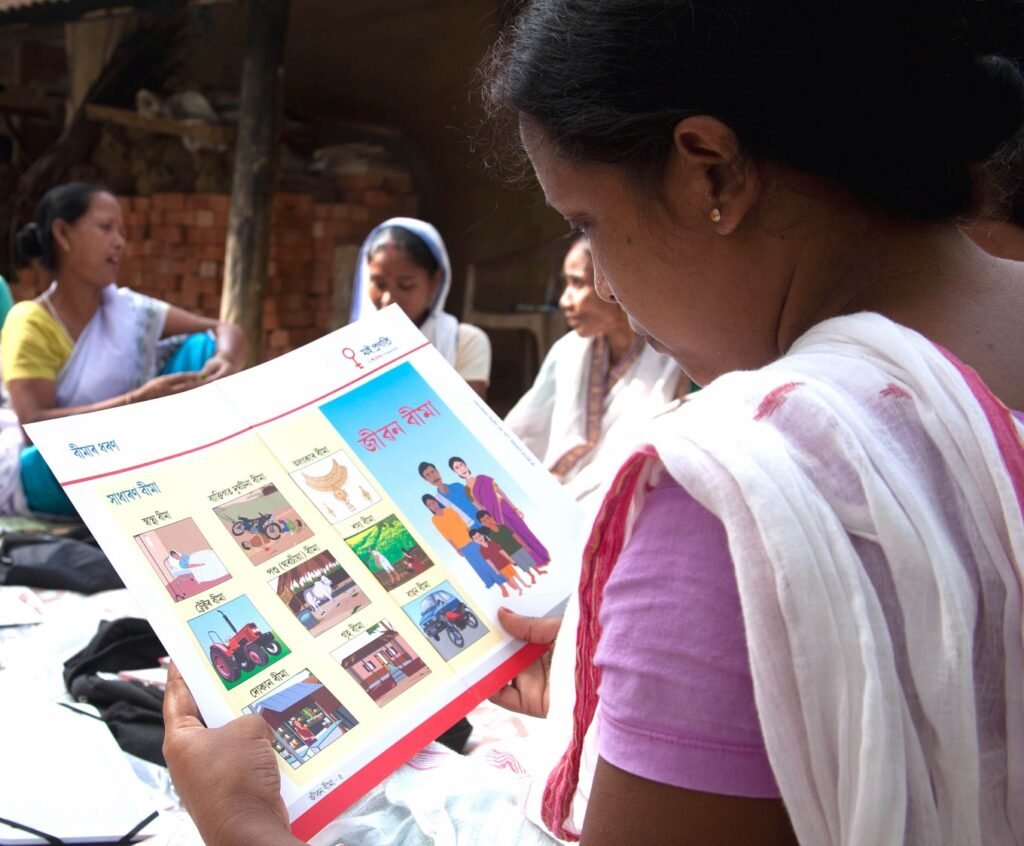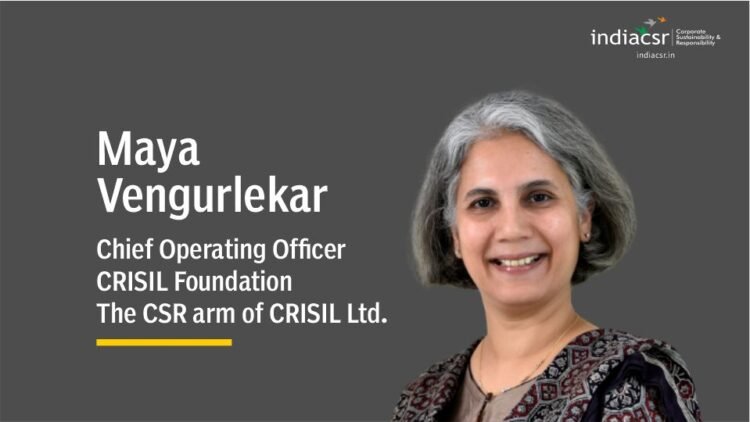As CSR leaders, we need to prioritise women’s empowerment as it can uplift entire communities, says Maya Vengurlekar
By Maya Vengurlekar
Suman Devi is from Kushalpura village in Dausa, Rajasthan. From being the bookkeeper of her self-help group, she has risen through the ranks to become a leader in her own right. Suman is a ‘Sakhi’ — a community woman leader under ‘Mein Pragati’ who is empowered to drive change and transform lives. Mein Pragati is CRISIL Foundation’s flagship financial capability building project among rural women that has won two national CSR awards.
The all-women, community-based grassroots workers’ cadre of Sakhis drives last-mile awareness and financial access in their communities. I was delighted to meet Suman and other Sakhis like her on my recent trip to a few villages in Rajasthan, where Mein Pragati is actively functioning. Their stories of resilience and determination left me deeply moved and transformed.

Empowering Women to Overcome Barriers
Suman has now bought her own plot of land with the income she earned through her Sakhi engagement. She has also started constructing a house in her village. Like her, many other Sakhis have overcome seemingly insurmountable social and economic barriers to build a better future for their families and communities. Started as a financial awareness initiative in 2015 across 500 villages of Assam and Rajasthan, Mein Pragati has over the past seven years witnessed a seven-fold increase, with the programme currently active in 3,800 villages in the two states.

Women in Finance and Decision-Making
From 500 Sakhis in 2018, earning an average monthly income of Rs 400 per month, the current Sakhi footprint has grown to over 3,600, with an average monthly income of Rs 2,500-3,000 per month. For me, Mein Pragati’s impact was striking in two respects. One, it has gradually helped shatter the myth that finance is a man’s domain. At the household level, women are getting more and more involved in taking specific decisions. The level of dependence on menfolk for banking services and financial transactions has reduced.
Community Empowerment Through Financial Knowledge
Two, the Sakhis have shown keen intent to add value to the larger community. I could see the sarpanch and rural menfolk approaching the Sakhis for help with insurance and pension policies, opening bank accounts, recommending government schemes for their children’s education, and advice on saving and investing their money wisely. Financial independence, awareness, and empowerment of women are all key for Rajasthan — and in the larger context, India — to realise inclusive growth, which is becoming harder and harder to ignore due to rising inequalities and concentration of power. Statistics bear this out, too.

Challenges in Achieving Financial Inclusion for Women
The recently launched FINDEX by the World Bank shows 76.6% of women in India were ‘financially included’ in 2017, i.e., were registered within the formal banking channels. On the other hand, 32% of women account holders reported not using their accounts, as opposed to 23% of male account holders. In addition, only 20% of women reported owning a debit or a credit card, compared with 35% of men folk.
Lower rank in Human Develpment Index
By most accounts, financial independence is linked with the opportunity and capacity to earn, though not limited to those. Three out of every four women aged 15 years and above in India are not financially independent. India’s female labour participation rate has been falling steadily and stands barely above 20% today. Despite being one of the fastest-growing economies, India ranks 131 out of 189 countries on the Human Development Index.

Financial Independence and Awareness
It follows, therefore, that plugging the gender gap and making women financially independent are imperatives — not just to improve rankings, but for better social outcomes and progress. Implied in these definitions is the notion of financial awareness. Even a woman who works and earns may not be financially independent if she is not financially aware and does not have other concomitant freedoms to exercise that awareness.
Public Policy and Awareness Efforts
The first, in large part, needs public policy support. Policies that focus on increasing the labour force participation of women in quality jobs are paramount. Two, such policies should be accompanied by widespread efforts to promote equity and empower women. For instance, women need to be made aware that they can save in formal and safe channels. They should be able to freely articulate their financial goals and opt for various products tailored around them, avail of credit for productive purposes, and secure their future and old age.

The Role of Companies and CSR Leaders
Three, all that knowledge must be channelled to lead to positive behavioural change in practice. It is clearly in the second and third areas that companies and their CSR leaders can play a proactive role.
My recent visit to Rajasthan provided me the following crucial insights and learnings.
- Rural women face numerous challenges and barriers in becoming aware of and accessing finance, yet continue to be the best negotiators when it comes to saving hard-earned money.
- Financial inclusion and empowerment are a force that unifies women across all social strata, by breaking the barriers of caste and religion.
- The ability to make financial choices and decisions independently provides women a sense of identity and dignity, more so in rural areas.
- Women’s empowerment undoubtedly has a ripple effect on the broader community and economy.
Bajayanti Rabha, our Sakhi from Goalpara, Assam since 2018, exemplifies how CSR interventions can make a great difference. Through her work, Bajayanti gained so much popularity and goodwill among the community that she won the local panchayat elections in 2019. She is now a ward member and an elected community leader.
The community looks up to her for advice regarding financial matters or any new scheme of the government. Now imagine what a multitude of Sakhis like Sumans and Bajayantis can do together. And what we, as corporate CSR leaders, can do for them.
About the Author
Maya Vengurlekar is the Chief Operating Officer of CRISIL Foundation, the CSR arm of CRISIL Ltd
Views are personal.























